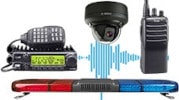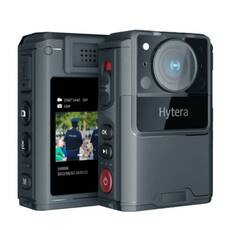Body Worn Camera
- further categoriesWhat is a body camera and why is it needed?
A body camera is a portable device that can be attached to clothing and is capable of recording video and audio, enabling the objective documentation of events. It can be used in security areas, at events, during technical installations, and in traffic and incident management. The recordings help with legal protection, quality control, and subsequent retrieval.
What tasks is a body camera suitable for?
Body cameras are particularly useful in situations where actions need to be recorded in a rapidly changing environment. They can be used, for example, for access control, security guard work, personal protection situations, and documenting mobile technical installations. They can also act as a deterrent against disorderly behavior.
How does body camera recording work?
The basis of body camera operation: a lens and microphone make continuous or event-triggered recordings, which are saved by the device to internal memory, an SD card, or the cloud. Recording can be activated manually (e.g., by pressing a button), automatically (e.g., in the case of motion detection), or configured to be event-triggered (e.g., motion detection, sound level change). Recordings are digitally encrypted and stored in authenticated storage so that they are suitable as evidence.
What are the most important technical features of a body camera?
Technical requirements include:
Resolution and frame rate: the higher the resolution, the more detailed the image, e.g., 1080p or 4K mode.
Sound recording quality: it must be possible to make clear sound recordings even in noisy environments.
Battery and operating time: continuous recording may be necessary during a shift, so 6-12 hours of operating time is the target.
Memory capacity and data management: internal storage or expandable SD/card solution, as well as automatic data backup.
Durability and robustness: shock, dust, and water resistance in critical mobile environments.
Security and data protection: tamper-proof recordings, encrypted storage, authorized access only.
Wearability and positioning: lightweight, compact design, comfortable mounting (on chest, shoulder, clothing), minimal interference with the wearer's movements.
What resolution is required for professional use?
For professional applications, the recommendation is a minimum of Full HD (1080p), but in many cases 2K or 4K resolution may be required. The advantage of higher resolution is that it expands the possibilities for facial recognition and detailed examinations. However, it should be noted that higher resolution means greater data and storage requirements and may also shorten operating time.
How long does a body camera battery last?
Depending on the device, recording frequency, and resolution, the operating time is usually 6 to 12 hours. Fast charging and replaceability are important: it may be necessary to replace the battery during a shift. Some models can also be operated with an external power supply or continuous charging.
What is the ideal memory capacity for a body camera?
Depending on the recording time and resolution, at least 32 GB of internal storage is recommended, but 64–128 GB may be justified for 4K recordings or longer shifts. It is important that the device supports regular backup or automatic archiving, and that recordings are stored in a structured manner – by date, event, or user.
Who is a body camera recommended for?
It is an ideal choice for security professionals, event technicians, technical installers, operators, transportation or traffic engineers, and any professional who works in an environment where events need to be documented or disputes arise.
What should you consider when buying a body camera?
Pros:
Detailed recording (high resolution)
Long battery life
Robust design, optimized for wearability
Reliable data management and storage
Cons:
Higher price due to resolution and features
High data and storage requirements
Complex setup and user interface may be required
Recommended criteria for selection
- Resolution and frame rate: for later recognition of details
- Battery life: so the device doesn't run out of power during a shift
- Memory/storage: for reliable documentation and retrieval
- Robustness: wearable even in harsh environments
- Data protection and security: recordings must be stored in an unalterable and lawful manner
How can the protection of body camera data be ensured?
Recordings made by body cameras are considered personal data, so data processing must comply with data protection regulations. The employer must accept the role of data controller and ensure that: recordings are made for a specific purpose; there is a legal basis (e.g., legitimate interest of the employer or legal obligation); a balancing test is carried out; recordings are only stored for as long as necessary; data subjects are informed in advance. During storage, it is recommended to apply encryption, access control, archiving, and deletion policies.
What does the law say about the use of body cameras?
In Hungary, the relevant legislation governing the use of body cameras in the workplace includes the General Data Protection Regulation (GDPR) and the Labor Code. An employer may use body cameras or require employees to wear them if: the purpose of the recording is clear (e.g., property protection, physical safety); there is a legal basis (e.g., legitimate interest of the employer); and the necessity and proportionality of the data processing can be justified. For example, the use of body cameras may be a legal obligation for employees performing certain public duties, but the data subjects must always be informed and the recording environment must be clearly marked. How do we store and process body camera recordings?
The following is particularly important when storing recordings:
- structured naming (date, user, event)
- automatic saving to network storage or a closed server
- access only for specific persons
- archiving and sorting or deleting after events within the specified time
- generation of metadata (e.g., time, GPS data, user).
Regular reviews and user rights management increase the security of the system.
What types of body cameras are available on the market?
Market segments: entry-level simple models; mid-range and high-end professional devices; models specifically designed for law enforcement or security purposes with extra features (GPS, WiFi, live streaming, night vision). When choosing, consider the area of application, wearing method, integration options, and operating requirements.
How much does a professional body camera cost?
Professional body cameras come in a wide range of prices: they can start at tens of thousands of forints, but more serious models can cost hundreds of thousands or even millions in Hungary. The price is influenced by resolution, operating time, durability, integration options (e.g., network charging, live video, GPS), and services (e.g., software, cloud storage, evidence management).
Frequently asked questions about body cameras
Is it legal for civilians to wear body cameras? Yes, but data protection regulations must be strictly observed. Civilians may only use them for their own purposes (e.g., self-defense, documentation); prior notification and consent are required for public recordings or recordings that affect others.
Does a body camera also record sound? Yes, most body cameras also have a microphone, so they record sound along with video. It is important to note that data protection and confidentiality rules apply to sound recording in the same way.
How often should recordings be backed up? Daily backups are recommended, especially if the recordings can be used as evidence. Setting up automatic backups to the cloud or a closed server increases data security.
How long can recordings be stored? The storage period is determined by legislation and internal data management policies. Generally, it is 30-90 days, unless the recording becomes part of an official procedure, in which case the retention period may be extended.
Can protection against deletion be set up? Yes, many body cameras support encrypted and unchangeable file formats, as well as deletion requiring a password or administrator rights. This is particularly important for recordings used as evidence.
Body cameras for everyday work
Body cameras are excellent professional tools that can help your business, event organization, security service, or technical team achieve a higher level of documentation and protection through recordings. The right technical specifications, compliance with data management requirements, and sourcing from a reliable supplier all serve to provide you, as a professional, with a stable and future-proof solution. We at DND Telecom Center are here to help you with this.


